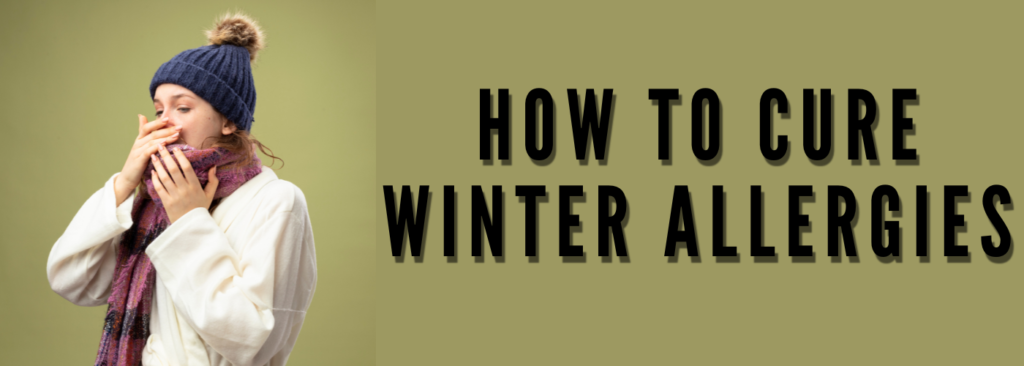
Table of Contents : How to Cure Winter Allergies
Introduction
Greetings, winter devotees! As the fresh breezes and cold mornings set in, countless us energetically expect the euphoric season of winter. In any case, all things considered, the start of winter moreover brings an undesirable companion – winter awarenesses. The natural air may be restoring for some, but for those leaned to winter responsive qualities, it can mean a period of wheezes, sneezes, and pain. Regardless, fear not, as we set out on a journey to track down how to fix winter responsive qualities and benefit from this otherworldly season without the bothersome wheezes.
Understanding Winter Allergies
Prior to jumping into the cures, we should pause for a minute to comprehend what precisely goals winter sensitivities. In opposition to mainstream thinking, winter sensitivities are not exclusively set off by outside components like dust. Truth be told, the guilty parties frequently hide inside the bounds of our own homes. Dust vermin, form spores, pet dander, and, surprisingly, indoor plants can all set off hypersensitive responses when we invest more energy inside during the colder months.

Understanding Winter Allergy Symptoms for “How to Cure Winter Allergies”
Recognizing Common Symptoms
Symptoms of winter allergies may vary from person to person but often include:
- Sneezing
- Runny or stuffy nose
- Itchy or watery eyes
- Coughing
- Fatigue
Identifying Specific Triggers
Common winter allergens include:
- Indoor allergens such as dust mites, pet dander, and mold
- Outdoor allergens like pollen from certain trees and grasses, especially in regions with mild winters
Causes of Winter Allergies
Winter sensitivities can be a confusing riddle, as many individuals partner sensitivities more with the sprouting blossoms of spring. Notwithstanding, the colder months accompany their own arrangement of triggers that can cause distress. The most well-known guilty parties include:
Indoor Allergens: Spending more time indoors during winter can expose you to indoor allergens such as dust mites, pet dander, and mold. Poor ventilation and heating systems can exacerbate the issue.
Christmas Trees: While a delightfully improved Christmas tree might be the highlight of your vacation celebrations, it can likewise present allergens like form and dust into your home.
Wood Smoke: Cozying up to a crackling fire sounds idyllic, but the smoke it produces can be irritating to the respiratory system, triggering allergic reactions.
Cold and Dry Air: The winter air tends to be drier, irritating nasal passages and making them more susceptible to allergens.
Over-the-Counter Medications for Winter Allergies
Antihistamines
- Over-the-counter antihistamines like loratadine or cetirizine can help relieve sneezing, itching, and runny nose.
Decongestants
- Decongestants such as pseudoephedrine or phenylephrine can help reduce nasal congestion, but use them with caution as they may cause side effects like increased heart rate and elevated blood pressure.
Effective and friendly ways to cure : How to Cure Winter Allergies
Now that we have a better understanding of what causes winter allergies, let’s delve into some effective and friendly ways to cure them.
Maintain a Clean Indoor Environment
One of the first steps in combating winter allergies is creating a clean and allergen-free indoor environment. Regular cleaning routines can significantly reduce the presence of dust mites, pet dander, and mold. Here are some tips:
Vacuum and dust regularly, paying special attention to carpets, curtains, and upholstered furniture.
Use allergen-proof covers on pillows and mattresses to keep dust mites at bay.
Keep indoor humidity levels below 50% to prevent mold growth. A dehumidifier can be a valuable ally in achieving this.
Choose the Right Christmas Tree
If you’re a fan of real Christmas trees, it’s essential to take precautions to minimize allergen exposure. Consider the following:
Shake the tree before bringing it indoors to remove any loose pollen or mold.
Allow the tree to dry completely before decorating, as mold thrives in damp conditions.
Opt for a smaller tree, as it will release fewer allergens into the air.
Be Mindful of Wood Smoke
While the warmth of a fireplace can be inviting, wood smoke can trigger allergies. Here’s how to enjoy a cozy fire without the irritation:
Use well-seasoned hardwoods, as they produce less smoke and combustion byproducts.
Ensure proper ventilation to minimize indoor air pollution.
Consider alternative heating sources, such as electric or gas heaters, to avoid wood smoke altogether.
Kick Out Mold
Mold spores love damp and dark places, making them common indoor allergens during the winter. Keep an eye out for areas prone to mold growth, such as bathrooms, basements, and kitchens. Use mold-resistant paint in susceptible areas and fix any leaks promptly. Regularly clean and disinfect these spaces to keep mold at bay.
Stay Hydrated
The dry winter air can dehydrate your body and exacerbate allergy symptoms. Staying hydrated is crucial for maintaining overall health and alleviating discomfort. Here’s how to keep yourself well-hydrated:
Drink plenty of water throughout the day.
Use a humidifier to add moisture to the air in your home, preventing your nasal passages from drying out.
Incorporate Allergy-Friendly Foods
Believe it or not, what you eat can also play a role in managing winter allergies. Certain foods, such as those rich in omega-3 fatty acids (like salmon, flaxseeds, and walnuts) and vitamin C (found in citrus fruits, strawberries, and bell peppers), possess anti-inflammatory properties that may help alleviate allergy symptoms. Additionally, spicy foods like chili peppers can help clear nasal congestion by promoting mucus drainage. Be sure to incorporate a variety of allergy-friendly foods into your diet to support your immune system and ease your winter allergy woes.
Choose the Right Winter Wardrobe
Believe it or not, your choice of winter clothing can influence your susceptibility to allergies. Follow these friendly tips to stay both warm and allergy-free:
Wash winter coats, scarves, and hats regularly to remove accumulated allergens.
Opt for hypoallergenic fabrics when choosing winter clothing.
Keep an extra layer or blanket handy when venturing outdoors to avoid prolonged exposure to the cold.
Practice Nasal Irrigation
Nasal irrigation, also known as nasal saline irrigation or nasal douching, is a natural remedy that can provide relief from nasal congestion and sinus pressure associated with winter allergies. Using a saline solution, either in the form of a saline nasal spray or a neti pot, helps flush out allergens and irritants from the nasal passages, providing instant relief and promoting clearer breathing. Just be sure to use distilled or sterilized water to prevent the risk of infection.
Explore Allergy-Friendly Winter Activities
Winter is a time for outdoor fun, and allergies shouldn’t keep you from enjoying the season. Consider these allergy-friendly activities:
Choose winter sports that involve less exposure to allergens, such as ice skating or snowshoeing.
Check local allergen forecasts before planning outdoor activities to stay informed about potential triggers.
Boost Your Immune System
A strong immune system can better fend off allergic reactions. Ensure you’re getting a balanced diet rich in vitamins and minerals. Include immune-boosting foods like citrus fruits, leafy greens, and yogurt in your meals. Regular exercise, adequate sleep, and stress management also play vital roles in supporting a robust immune system.
Natural Remedies for Symptom Relief
Embrace the power of natural remedies to ease your winter allergy symptoms. Nasal saline irrigation can help flush out irritants from your nasal passages. Honey, with its anti-inflammatory properties, may soothe a scratchy throat. Herbal supplements like butterbur and quercetin have shown promise in reducing allergy symptoms.
Consult an Allergist
If your winter allergies persist or worsen, it’s advisable to seek professional help. An allergist can conduct specific tests to identify your allergens and tailor a treatment plan to your needs. They may recommend allergy medications, immunotherapy, or other interventions to help you better manage your symptoms.
Stay Informed About Outdoor Allergens
Even in winter, outdoor allergens like pollen can linger. Keep an eye on local pollen forecasts and plan your outdoor activities accordingly. If you have outdoor allergies, wear a mask when doing yard work and consider keeping windows closed during peak pollen times.
Mind-Body Practices for Stress Reduction
Stress can exacerbate allergy symptoms, so it’s crucial to find ways to relax and unwind. Engage in mind-body practices like yoga, meditation, or deep breathing exercises to help alleviate stress and boost your overall well-being.
Get Plenty of Rest
Quality sleep is essential for overall health and well-being, especially when combating winter allergies. Aim for seven to nine hours of uninterrupted sleep per night to allow your body to repair and regenerate, and to give your immune system the strength it needs to fend off allergens. Create a relaxing bedtime routine, minimize screen time before bed, and ensure your bedroom environment is conducive to restful sleep to optimize your sleep quality and allergy resilience.

Consider Immunotherapy
For individuals with severe or persistent winter allergies that do not respond to conventional treatments, allergen immunotherapy may be a viable option. Also known as allergy shots or allergy drops, immunotherapy involves gradually exposing the immune system to small doses of allergens to desensitize the body’s response over time. While immunotherapy requires commitment and patience, it can provide long-term relief from winter allergy symptoms and improve overall quality of life for allergy sufferers.
Seek Professional Advice
If your winter allergy symptoms persist despite trying various home remedies and lifestyle changes, it may be time to seek professional advice from a healthcare provider. Allergists specialize in diagnosing and treating allergies and can offer personalized recommendations tailored to your specific needs. They may suggest prescription medications, such as antihistamines, nasal corticosteroids, or allergy shots, to help alleviate your symptoms and improve your quality of life during the winter months.
Consulting with a Healthcare Professional – How to Cure Winter Allergies
Allergy Testing
Consider allergy testing to identify specific triggers and develop a personalized treatment plan.
Customized Treatment Plans
Work with a healthcare provider to develop a comprehensive treatment plan that may include prescription medications, immunotherapy, or other interventions.

Prepare for Outdoor Activities
While winter allergies are often associated with indoor allergens, outdoor allergens like pollen can still trigger symptoms, especially during milder winter days. If you plan to spend time outdoors, particularly when engaging in activities like skiing, snowboarding, or hiking, take proactive measures to minimize exposure to allergens. Wear a scarf or mask to cover your nose and mouth, keep windows closed while driving or at home, and shower and change clothes after outdoor activities to remove allergens from your skin and hair.
Monitor Weather Conditions : How to Cure Winter Allergies
Stay informed about weather conditions and pollen forecasts in your area to better anticipate and manage your winter allergy symptoms. Cold, dry weather can exacerbate nasal congestion and respiratory irritation, while warm, windy days can increase pollen levels, triggering allergy symptoms in susceptible individuals. By staying aware of weather patterns and planning accordingly, you can minimize your exposure to allergens and enjoy winter activities with greater comfort and ease.

Be Proactive About Prevention
Prevention is key when it comes to managing winter allergies. Take proactive measures to reduce allergen exposure in your home and surroundings, such as regularly cleaning and dusting, using allergen-proof bedding covers, and maintaining optimal indoor humidity levels. Additionally, avoid smoking and exposure to secondhand smoke, as cigarette smoke can exacerbate allergy symptoms and compromise respiratory health.
Stay Informed and Educated : How to Cure Winter Allergies
Knowledge is power when it comes to managing winter allergies effectively. Stay informed about common allergens, triggers, and treatment options by reading reputable sources, consulting with healthcare professionals, and connecting with support groups or online communities for allergy sufferers. By educating yourself about your condition and available resources, you can make informed decisions about managing your winter allergies and taking control of your health and well-being.

Embrace a Positive Mindset – How to Cure Winter Allergies
Last but not least, maintain a positive mindset and outlook as you navigate the challenges of winter allergies. While allergy symptoms can be frustrating and inconvenient, focusing on the things you can control, such as your lifestyle choices and treatment strategies, can help you feel empowered and resilient in the face of adversity. Practice self-care, surround yourself with supportive friends and family, and remember to celebrate your victories, no matter how small, on your journey to conquering winter allergies and living your best life.
Foster a Healthy Lifestyle
Maintaining a healthy lifestyle can also play a significant role in managing winter allergies. Regular exercise, a balanced diet rich in fruits and vegetables, adequate hydration, and sufficient sleep can all support your immune system and reduce the severity of allergy symptoms. Aim to incorporate these healthy habits into your daily routine to strengthen your body’s natural defenses against allergens and improve your overall well-being.
Practice Good Respiratory Hygiene
Practicing good respiratory hygiene is essential for minimizing the spread of allergens and preventing respiratory infections, which can exacerbate winter allergy symptoms. Cover your mouth and nose with a tissue or your elbow when coughing or sneezing, wash your hands frequently with soap and water, and avoid touching your face to reduce the risk of allergen exposure and transmission. Additionally, consider wearing a mask in crowded or indoor settings to further protect yourself from allergens and airborne particles.

Create an Allergy Action Plan
Creating an allergy action plan can help you effectively manage your winter allergy symptoms and respond quickly in the event of an allergic reaction or flare-up. Work with your healthcare provider to develop a personalized action plan that outlines your allergy triggers, symptoms, and treatment strategies. Be sure to share your action plan with family members, friends, and coworkers, so they can support you in managing your allergies and responding appropriately in emergency situations.
Practice Self-Care
Taking care of yourself is crucial for managing winter allergies and maintaining your overall health and well-being. Practice self-care activities that help reduce stress, promote relaxation, and boost your mood, such as meditation, yoga, deep breathing exercises, or indulging in hobbies and interests you enjoy. Prioritize self-care as part of your daily routine to recharge and rejuvenate, allowing you to better cope with the challenges of winter allergies and enjoy life to the fullest.

Stay Positive and Resilient
Finally, stay positive and resilient in the face of winter allergies. While dealing with allergy symptoms can be frustrating and discouraging at times, maintaining a positive attitude and mindset can help you navigate challenges more effectively and overcome obstacles with grace and determination. Surround yourself with supportive individuals who uplift and encourage you, and remember to celebrate your successes and accomplishments, no matter how small. With perseverance and optimism, you can conquer winter allergies and embrace the season with confidence and joy.
Seeking Support from Allergy Communities
Online Forums and Groups
- Join online forums or social media groups dedicated to allergy support to connect with others facing similar challenges and share tips and advice.
Local Support Networks
- Explore local allergy support groups or meetups to connect with others in your community for additional support and resources
Staying Prepared for Flare-Ups : How to Cure Winter Allergies
Developing an Emergency Action Plan
Create an allergy action plan outlining steps to take in case of a severe allergic reaction or flare-up.
Carrying Medications at All Times
Carry necessary medications such as epinephrine injectors or antihistamines with you at all times, especially when traveling or participating in outdoor activities.

Importance of Regular Follow-Ups with Healthcare Providers
Monitoring Allergy Symptoms
Keep track of your allergy symptoms and discuss any changes or concerns with your healthcare provider during regular follow-up appointments.
Adjusting Treatment Plans as Necessary
Work with your healthcare provider to adjust your treatment plan as needed based on changes in symptoms, triggers, or overall health.

Conclusion
Winter allergies may cast a chilly shadow on the season, but with the right approach, you can enjoy the magic of winter without the discomfort. By creating a clean indoor environment, making thoughtful choices about Christmas trees and heating sources, staying hydrated, and being mindful of your winter wardrobe, you can effectively alleviate and even cure winter allergies.
Remember, the key to a joyful winter lies in striking a balance between embracing the season’s beauty and taking proactive steps to minimize allergen exposure. So, bundle up, sip on that hot cocoa, and revel in the winter wonderland around you – allergy-free and full of delight!

Unique FAQs related to How to Cure Winter Allergies
Can winter allergies cause asthma attacks?
- Yes, exposure to allergens can trigger asthma symptoms in individuals with underlying asthma.
Are there any foods that can worsen winter allergy symptoms?
- Some individuals may experience worsened symptoms after consuming dairy products, processed foods, or foods high in histamine.
Is it possible to outgrow winter allergies?
- While allergies can develop or fade over time, it’s essential to manage symptoms effectively, as allergies can persist throughout life.
Can pets contribute to indoor allergens during the winter months?
- Yes, pet dander can exacerbate allergies, so it’s essential to minimize exposure by keeping pets groomed and out of bedrooms.
Are there any alternative therapies that can help with winter allergies?
- Some individuals find relief from acupuncture, acupressure, or chiropractic care, but results may vary, and it’s essential to consult with a healthcare provider before trying alternative therapies.
You can also see: Unravelling 100 Mystery of Hyperinflated Lungs : What You Need to Know

Hello Neat post Theres an issue together with your site in internet explorer would check this IE still is the marketplace chief and a large element of other folks will leave out your magnificent writing due to this problem
I appreciate your time spent reading my blog. Your engagement means a lot, and I hope you found the content enjoyable and insightful. Thank you for being a reader!
We will try our best to fix the problem.
What i dont understood is in reality how youre now not really a lot more smartlyfavored than you might be now Youre very intelligent You understand therefore significantly in terms of this topic produced me personally believe it from a lot of numerous angles Its like women and men are not interested except it is one thing to accomplish with Woman gaga Your own stuffs outstanding Always care for it up
Expressing gratitude for the positive and thoughtful comments on my blog is both heartwarming and encouraging. Your kind words not only brighten my day but also motivate me to continue sharing content that resonates with you. Thank you for taking the time to read my posts. Your comments are greatly appreciated and inspire me to keep writing and sharing my thoughts and ideas.
Its like you read my mind You appear to know a lot about this like you wrote the book in it or something I think that you could do with some pics to drive the message home a little bit but instead of that this is fantastic blog An excellent read I will certainly be back
Expressing gratitude for the positive and thoughtful comments on my blog is both heartwarming and encouraging. Your kind words not only brighten my day but also motivate me to continue sharing content that resonates with you. Thank you for taking the time to read my posts. Your comments are greatly appreciated and inspire me to keep writing and sharing my thoughts and ideas.
I don’t think the title of your article matches the content lol. Just kidding, mainly because I had some doubts after reading the article.
Thank you for your sharing. I am worried that I lack creative ideas. It is your article that makes me full of hope. Thank you. But, I have a question, can you help me?
Sure, you can share your questions through e mail. Thank you
Thanks for sharing. I read many of your blog posts, cool, your blog is very good.